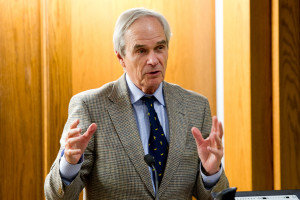
Commentaries on new book reinforce its author’s call for strengthening the civil service.
I have been honored by the responses to my new book, Valuing Bureaucracy: The Case for Professional Government, from such an outstanding group of commenters whose work I have admired for many years. Like many authors feel after receiving so many thoughtful responses, I have been improved by the experience. Let me set out some notable points and connect them to the case I make in Valuing Bureaucracy for reinvigorating the civil service in the United States.
Dave Lewis, in his typically deep research style, answers empirically one of the oldest objections to the career service: Are they part of a (liberal) deep state of recalcitrant bureaucrats? By surveying those in government on a liberal/conservative scale and evaluating agencies on the same basis, he shows that the civil service is responsive in both Democratic and Republican presidencies. So, we do not have a “deep state” conspiracy, which is good news for my argument for professional government.
But Lewis also notes that agencies themselves draw liberals or conservatives to their ranks—e.g., think of the U.S. Environmental Protection Agency (EPA) versus the U.S. Department of Homeland Security, respectively. As a result of this self-selection by employees, and the resulting ideological tendencies in agency administration that it can foster, political officials are needed to lead these agencies and ensure that they move in a direction more reflective of the electorate.
Here, the Trump Administration is not on board. It is way behind predecessors in appointing political professionals and seemingly has no interest in catching up. Although EPA has an Administrator who is challenging the mission of that agency, there are still few appointees at the upper levels of the State Department, leaving the Secretary to run our most important international policy institution from his office with little help from expert political advisors. The irony is that career officials, who the President denigrates, are the only ones in place to lead, assuming they have not been reassigned to irrelevant roles. This is a vacuum that only contractors can fill, an outcome which surely further undermines the cause for professional government.
As Don Kettl reminds us, professional government is not just something desirable to have, it is essential to the democratic commitment to the rule of law. Kettl’s deep understanding of the Constitution and experience with government allows him to identify the rule-of-law complexities “quietly working below the surface” and to fear that these operating principles are becoming “unmoored” as contractor government (or “government by proxy”) proceeds apace. As a political scientist, Kettl adds to similar warnings from the legal community from legal scholars like Gillian Metzger and Jon Michaels. It is important to merge these disciplines under the rule-of-law banner because all branches are implicated and we may not be able to preserve the rule of law through the judicial branch alone. Kettl fears there is a “growing gap between the rule of law, as it now exists, and the proxy-based tools of government action.” We would do well to heed his warning.
One reason professionals are needed in government is that they exercise discretion, which is a non-delegable duty under the Constitution and the rule of law. I reframed the discretion requirement into a nascent theory of “workarounds,” a theory that recognizes the necessity occasionally to circumvent rules and regulations in order to get things done. John DiIulio generously calls this “the single most nuanced and novel part of the book”—although it is not an easy case to make. In fact, when I try it out on students, they are skeptical if not hostile to the idea of a legitimate role for workarounds. They fear that I have jettisoned the rule of law in the process. But other professionals engage in workarounds—it is an engineering term—and government officials who want to make the system work do so regularly, if quietly. I take comfort from Adrian Vermeule’s Madisonian idea that the Constitution contemplates an “optimal abuse of power.”
Under my theory, only government professionals, and certainly not contractors, are authorized to engage in workarounds. This is an “inherent government function” that cannot be delegated. As much as I praise career officials who engage in these productive workarounds, Matt Wiener, who knows about government from the inside, expresses skepticism that many such professionals exist, suggesting that government is in fact populated by cautious bureaucrats for whom I have reserved a special place in purgatory. Wiener may be right, and I concede that the empirical evidence is still thin about the distribution of government officials’ posture toward workarounds. (Maybe Lewis can gather more such evidence?) But I stand by my belief that there are effective people willing to do what is necessary to achieve excellence in government.
Shelley Metzenbaum, who has served admirably in government at the state and federal levels, questions whether lack of professionalism is really the impediment to good government I view it to be. To her, operational factors like clear goals, preparation, learning, resources and accountability mechanisms are the keys to effective government. Metzenbaum illustrates her points through the responses to disasters caused by hurricanes Harvey and Irma, where things worked, and Maria where they did not. In my view, Metzenbaum and I are both right. You need her emphasis on operational factors, but those factors only work well in the hands of professionals. FEMA and state disaster agencies exhibited professionalism in the first two hurricane responses, but in Puerto Rico and Maria professionalism failed at both levels.
The necessary disaster responses were not jointly coordinated in Puerto Rico in the case of Hurricane Maria, perhaps because of the different relationship of Puerto Rico to the federal government. In terms of failed professional behavior, look at the contracts awarded to two companies, Bronze Star ($30 million for non-delivered tarps) and Whitefish Holdings ($300 million for electric power regeneration). Both failed miserably to perform and are in litigation. Professional managers would never have awarded these contracts in the first place. The lack of adequate contractor resources is a prominent example of the kind of professionals that are needed in government. Understaffed government contracting offices lead to poorly drawn agreements, unqualified awardees and, in the Whitefish situation, potential regulatory capture questions related to Interior Secretary Ryan Zinke. That good operational standards will only be achieved through good managers is a proposition on which I hope Metzenbaum and I can both agree.
Dick Pierce, who never pulls punches, wonders whether my call for valuing bureaucracy is ultimately doomed. I am sensitive to this critique, which is why I put on my book’s cover the painting of Justice Holmes as Don Quixote. But Pierce has forced me to dig deeper for justifications for reinvigorating professionalism in government service and rebalancing the contractor state. So too has Elaine Karmarck, who led the Clinton-Gore reinventing government initiative and who sees continuing needs for contractors in government, especially in areas of expertise like information technology. She suggests a presidential commission that might identify those functions that are inherently governmental and should not be contracted out. I like that idea, but doubt that the current Administration has it on its list of next steps.
Of course, in expressing skepticism about the current Administration, I realize that I may seem to have succumbed as much to the new realities as those who view my quest as quixotic have succumbed to more persistent ones. DiIulio surprises me in this regard. He is the most optimistic person I know, but even he says that he wishes he could be “half as hopeful” as I am. Clearly, in making the case for rebalancing the system and valuing the civil service more than we currently do, I have some convincing to do.
One response is to say that, if I am Cervantes’s Don, there are a lot of Sancho Panzas out there who buy into the need for governmental reform. The most significant one recently is the National Academy of Public Administration, which has issued the important report, No Time To Wait: Building a Public Service For the 21st Century, written by a panel chaired by Don Kettl, which makes important suggestions about how to fix the civil service system and the contractor regime. As I maintain in Valuing Bureaucracy, unless we make the system more functional in terms of hiring and disciplining employees, there will be no way to slow down the growth in the contractor state.
Moreover, there are signs that suggest civil service reform is on Congress’s mind. For example, the Competitive Civil Service Act of 2015 makes it possible to share candidate data among agencies so that good finalists are not lost in the system and hiring is accelerated. I was also interviewed recently, as I assume were several of our commenters, by staff at the U.S. Government Accountability Office, which is doing a human capital study for the Senate Regulatory Affairs Subcommittee, led by U.S. Senators James Lankford (R-OK) and Heidi Heitkamp (D-ND). The focus is on how to attract and retain civil servants, just what I and others are advocating.
It is doubtful the current Administration in Washington, D.C. will provide many opportunities for serious reform proposals to emerge. On the contrary, we will have all we can do to keep valuable professionals from being transferred into dead-end assignments or resigning in frustration. Moreover, the concurrent budget resolution for 2018 paves the way for massive cuts to agencies and programs that will make hiring new talent that much more difficult. Furthermore, if the deduction for state and local taxes is eliminated, the infrastructure improvements that the nation so greatly needs, which are substantially funded by state and local bonds, will be stymied.
These macro changes would only make it that much harder for bright new talent to come into the government, rather than joining the contractor community. But persisting in the face of all this still seems a public service worth rendering, which is a conclusion I suspect all the authors of the commentaries will accede to as well.
This essay is part of a nine-part series, entitled Valuing Professional Government.




